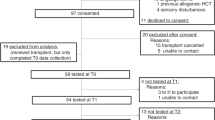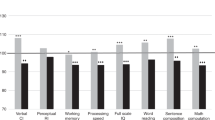Abstract
A prospective longitudinal study of cognitive and psychosocial functioning in pediatric hematopoietic stem cell transplant (HSCT) patients was conducted on three occasions: pre-HSCT, 1 year post-HSCT, and 2 years post-HSCT. In contrast to the previous hypothesis that cognitive declines would occur as a result of HSCT treatment, it was hypothesized that (1) global cognitive functioning (IQ scores), as well as specific areas would remain stable over time; (2) pre-transplant functioning would be predictive of later functioning; and (3) age would be negatively related to cognitive functioning. Based on previous research it was further hypothesized: that (4) while declines in psychosocial functioning might be seen at 1 year, functioning would improve by 2 years. 153 children and adolescents were evaluated pre-HSCT and at 1 year, with 2 year data available for 74 children. Longitudinal analyses of Wechsler IQ data were completed on 100 children (longitudinal exact test) and 52 children (repeated measures analysis of variance. Results of cognitive assessment indicated (1) stability of IQ scores over time; and (2) that the strongest predictor was pre-HSCT cognitive functioning. Psychosocial assessment results indicated: (1) a low prevalence of behavioral and social problems; (2) stability in functioning over time; (3) pre-HSCT functioning strongly predictive of later functioning.
This is a preview of subscription content, access via your institution
Access options
Subscribe to this journal
Receive 12 print issues and online access
$259.00 per year
only $21.58 per issue
Buy this article
- Purchase on Springer Link
- Instant access to full article PDF
Prices may be subject to local taxes which are calculated during checkout
Similar content being viewed by others
References
Butler RW, Hill JM, Steinherz PG et al. Neuropsychological effects of cranial irradiation, intrathecal methotrexate and systemic methotrexate in childhood cancer J Clin Oncol 1994 12: 2621 2629
Mulhern RK . Neuropsychological late effects. In: D Bearison, RK Mulhern (eds) Pediatric Psychooncology Oxford University Press: New York 1994 99 121
Stehbens JA, Kaleita TA, Noll RB et al. CNS prophylaxis of childhood leukemia: what are the long-term neurological, neuropsychological and behavioral effects? Neuropsychol Rev 1991 2: 147 177
Brown RT, Madan-Swain A, Pais R et al. Chemotherapy for acute lymphocytic leukemia: cognitive and academic sequelae J Pediatr Psychol 1992 121: 885 889
Copeland DR, Moore BD, Francis DJ et al. Neuropsychological effects of chemotherapy on children with cancer: a longitudinal study J Clin Oncol 1996 14: 2826 2835
Ochs J, Mulhern RK, Fairclough D et al. Comparison of neuropsychologic functioning and clinical indicators of neurotoxicity in long-term survivors of childhood leukemia given cranial radiation or parenteral methotrexate: a prospective study J Clin Oncol 1991 9: 145 151
McGuire T, Sanders JE, Hill JD et al. Neuropsychological function in children given total body irradiation for marrow transplantation Exp Hematol 1991 19: 578 (Abstr.)
Smedler AC, Bergman H, Bolme P et al. Neuropsychological functioning in children treated with bone marrow transplantation J Clin Exp Neuropsychol 1988 10: 325 326 (Abstr.)
Arvidson J, Larsson B, Lonnerhom G . A long-term follow-up study of psychosocial functioning after autologous bone marrow transplantation in childhood Psycho-Oncology 1999 8: 123 134
Halberg FE, Wara WM, Weaver KE et al. Total body irradiation and bone marrow transplantation for immunodeficiency disorders in young children Radiother Oncol 1990 18: 114 117
Kaleita TA, Shields WD, Tesler A et al. Normal neurodevelopment in four young children treated for acute leukemia or aplastic anemia Pediatrics 1989 83: 753 775
Pot-Mees CC . The Psychological Aspects of Bone Marrow Transplantation in Children Eburon: Delft 1989
Kramer JH, Crittenden MR, Halberg FE et al. A prospective study of cognitive function following low-dose cranial radiation for bone marrow transplantation Pediatrics 1992 90: 447 450
Phipps S, Brenner M, Heslop H et al. Psychological effects of bone marrow transplantation on children and adolescents: preliminary report of a longitudinal study Bone Marrow Transplant 1995 15: 829 835
Cool V . Neuropsychological functioning: pre- and post-bone marrow transplant Dissertations Abstr Int 1992 52: 2463
Kramer JH, Crittenden MR, DeSantes K, Cowan MJ . Cognitive and adaptive behaviour 1 and 3 years following bone marrow transplant Bone Marrow Transplant 1997 19: 607 613
Simms S, Kazak AE, Gannon T et al. Neuropsychological outcome of children undergoing bone marrow transplantation Bone Marrow Transplant 1998 22: 181 184
Phipps S, Dunavant M, Srivastava DK et al. Cognitive and academic functioning in survivors of pediatric bone marrow transplantation J Clin Oncol 2000 18: 1004 1011
Stuber ML, Nader K, Yasuda R et al. Stress responses after pediatric bone marrow transplantation: preliminary results of a prospective longitudinal study J Acad Child Adolesc Psychiatr 1991 30: 952 957
Stuber ML, Nader K . Psychiatric sequelae in adolescent bone marrow transplantation survivors J Psychother Practice Res 1995 4: 30 42
Phipps S, Mulhern R . Family cohesion and expressiveness promote resilience to the stress of pediatric bone marrow transplant: a preliminary report J Dev Behav Pediatr 1995 16: 257 263
Schmidt GM, Niland JC, Forman SJ et al. Extended follow-up in 212 long-term allogeneic bone marrow transplant survivors: issues of quality of life Transplantation 1993 55: 551 557
Penati B, Kupst MJ, Casper JT et al. Psychological adjustment to pediatric bone marrow transplantation: a prospective study Paper presented at the American Psychological Association, Washington DC 1994
Vanatta K, Zeller M, Noll RB et al. Social functioning of children surviving bone marrow transplantation J Pediatr Psychol 1998 23: 169 178
Debban B, Kupst MJ, Lima S . Psychological adjustment in long-term survivors of pediatric bone marrow transplant Paper presented at the American Psychological Association, Boston MA 1999
Barrera M, Boyd-Pringle LA, Sumbler K et al. Quality of life and behavioral adjustment after pediatric bone marrow transplantation Bone Marrow Transplant 2000 26: 427 435
Kupst MJ, Schulman JL . Long-term coping with pediatric leukemia J Pediatr Psychol 1988 13: 7 22
Kazak AE, Penati B, Boyer BA et al. A randomized controlled prospective outcome study of a psychological and pharmacological intervention protocol for procedural distress in pediatric leukemia J Pediatr Psychol 1996 21: 615 632
Hollingshead AB . Four Factor Index of Social Status Yale University: New Haven 1975
Casper JT, Camitta B, Truitt R et al. Unrelated bone marrow donor transplants for children with leukemia or myelodysplasia Blood 1995 85: 2354 2363
Shulman HM, Sullivan KM, Weiden PI et al. Chronic graft-versus-host disease syndrome in man: a long-term clinicopathologic study of 20 Seattle patients Am J Med 1980 69: 204 217
Thomas ED, Storb R, Clift RA et al. Bone marrow transplantation New Engl J Med 1975 292: 832 839
Achenbach TM . Manual for the Child Behavior Checklist/4-18 and 1991 Profile University of Vermont, Department of Psychiatry: Burlington, VT 1991
Bayley N . Manual for the Bayley Scales of Infant Development The Psychological Corporation: San Antonio, TX 1969
Bayley N . Manual for the Bayley Scales of Infant Development The Psychological Corporation, San Antonio,TX 1993
Sparrow SS, Balla DA, Cicchetti DV . Vineland Adaptive Behavior Scales American Guidance Service, Circle Pines, MN 1984
Wechsler D . Wechsler Preschool and Primary Intelligence Scales for Children, Revised The Psychological Corporation: New York 1989
McCarthy D . McCarthy Scales of Children's Abilities The Psychological Corporation: San Antonio, TX
Wechsler D . Wechsler Intelligence Scale for Children, Revised The Psychological Corporation: New York 1974
Wechsler D . Wechsler Intelligence Scale for Children, III The Psychological Corporation: New York 1991
Wechsler D . Wechsler Adult Intelligence Scale, Revised The Psychological Corporation: New York 1981
Wilkinson GS . The Wide Range Achievement Test Administration Manual Wide Range: Wilmington, DE 1993
Kepner J . Personal communication
Armstrong FD, Mulhern RK . Acute lymphoblastic leukemia and brain tumors. In: RT Brown (ed.) Cognitive Aspects of Chronic Illness in Children Guilford Press: New York 1999 47 77
Sattler J . Assessment of Children — fourth edition. Jerome M Sattler: San Diego 2001
Thompson RJ, Gustafson KE . Adaptation of Chronic Childhood Illness American Psychological Association: Washington DC 1996
Brown RT, Madan-Swain A, Walco GA et al. Cognitive academic late effects among children previously treated for acute lymphocytic leukemia receiving chemotherapy as CNS prophylaxis J Pediatr Psychol 1998 23: 219 228
Noll RB, MacLean WE, Whitt JK et al. Behavioral adjustment and social functioning of long-term survivors of childhood leukemia: parent and teacher reports J Pediatr Psychol 1997 22: 827 841
Greenberg H, Kazak AE, Meadows A . Psychological adjustment in 8–16 year old cancer survivors and their parents J Pediatr 1989 114: 488 493
Kupst MJ, Natta MB, Richardson CC et al. Family coping with pediatric leukemia: Ten years after treatment J Pediatr Psychol 1995 20: 601 617
Acknowledgements
The authors wish to thank Molly Garwood, PhD, Kristine Martin, PhD, Alan Silverman, PhD, and Kristin Bingen, PhD for their help in the psychological assessment of pediatric hematopoietic stem cell transplant patients and donors. Thanks are also due the hematopoietic stem cell transplant mental health team, especially Paula Thompson, MSW, Sheila Feeley, MSW, Jill Perrone, RN, CPNP, Lynnette Anderson, RN, CPNP, and Mary Lauer, RN, CPNP. We wish to acknowledge the help of Diane Bauer, Mara Pelz, Sara Todryk, Laura Oland, and Andrea Libber in data compilation and reference research. We are grateful to Steven Simms, PhD for his helpful review of this manuscript, to Jim Kepner, PhD for his consultation on longitudinal data analysis, and to Brent Logan, PhD and Dan Eastwood, MS for additional statistical consultation. Partial support for this research was provided by the MACC (Midwest Athletes Against Childhood Cancer) Fund.
Author information
Authors and Affiliations
Rights and permissions
About this article
Cite this article
Kupst, M., Penati, B., Debban, B. et al. Cognitive and psychosocial functioning of pediatric hematopoietic stem cell transplant patients: A prospective longitudinal study. Bone Marrow Transplant 30, 609–617 (2002). https://doi.org/10.1038/sj.bmt.1703683
Received:
Accepted:
Published:
Issue Date:
DOI: https://doi.org/10.1038/sj.bmt.1703683
Keywords
This article is cited by
-
Neurocognitive functioning in long-term survivors of pediatric hematopoietic cell transplantation
Bone Marrow Transplantation (2021)
-
Neurocognitive dysfunction in hematopoietic cell transplant recipients: expert review from the late effects and Quality of Life Working Committee of the CIBMTR and complications and Quality of Life Working Party of the EBMT
Bone Marrow Transplantation (2018)
-
Incidence and severity of crucial late effects after allogeneic HSCT for malignancy under the age of 3 years: TBI is what really matters
Bone Marrow Transplantation (2016)
-
Social outcome in children treated by haematopoietic cell transplant for congenital immunodeficiency
Bone Marrow Transplantation (2011)
-
Psychological effects of hematopoietic SCT on pediatric patients, siblings and parents: a review
Bone Marrow Transplantation (2010)



